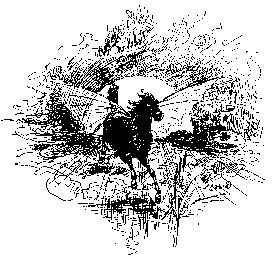The Piper and the Puca by Douglas Hyde
Translated literally from the Irish of the Leabhar Sgeulaigheachta.
In the old times, there was a half fool living in Dunmore, in the county Galway, and although he was excessively fond of music, he was unable to learn more than one tune, and that was the "Black Rogue." He used to get a good deal of money from the gentlemen, for they used to get sport out of him. One night the piper was coming home from a house where there had been a dance, and he half drunk. When he came to a little bridge that was up by his mother's house, he squeezed the pipes on, and began playing the "Black Rogue" (an rógaire dubh). The Púca came behind him, and flung him up on his own back. There were long horns on the Púca, and the piper got a good grip of them, and then he said——
"Destruction on you, you nasty beast, let me home. I have a ten-penny piece in my pocket for my mother, and she wants snuff."
"Never mind your mother," said the Púca, "but keep your hold. If you fall, you will break your neck and your pipes." Then the Púca said to him, "Play up for me the 'Shan Van Vocht' (an t-seann-bhean bhocht)."
"I don't know it," said the piper.
"Never mind whether you do or you don't," said the Púca. "Play up, and I'll make you know."
The piper put wind in his bag, and he played such music as made himself wonder.
"Upon my word, you're a fine music-master," says the piper then; "but tell me where you're for bringing me."
"There's a great feast in the house of the Banshee, on the top of Croagh Patric to-night," says the Púca, "and I'm for bringing you there to play music, and, take my word, you'll get the price of your trouble."
"By my word, you'll save me a journey, then," says the piper, "for Father William put a journey to Croagh Patric on me, because I stole the white gander from him last Martinmas."
The Púca rushed him across hills and bogs and rough places, till he brought him to the top of Croagh Patric. Then the Púca struck three blows with his foot, and a great door opened, and they passed in together, into a fine room.
The piper saw a golden table in the middle of the room, and hundreds of old women (cailleacha) sitting round about it. The old women rose up, and said, "A hundred thousand welcomes to you, you Púca of November (na Samhna). Who is this you have with you?"
"The best piper in Ireland," says the Púca.
One of the old women struck a blow on the ground, and a door opened in the side of the wall, and what should the piper see coming out but the white gander which he had stolen from Father William.
"By my conscience, then," says the piper, "myself and my mother ate every taste of that gander, only one wing, and I gave that to Moy-rua (Red Mary), and it's she told the priest I stole his gander."
The gander cleaned the table, and carried it away, and the Púca said, "Play up music for these ladies."
The piper played up, and the old women began dancing, and they were dancing till they were tired. Then the Púca said to pay the piper, and every old woman drew out a gold piece, and gave it to him.
"By the tooth of Patric," said he, "I'm as rich as the son of a lord."
"Come with me," says the Púca, "and I'll bring you home."
They went out then, and just as he was going to ride on the Púca, the gander came up to him, and gave him a new set of pipes. The Púca was not long until he brought him to Dunmore, and he threw the piper off at the little bridge, and then he told him to go home, and says to him, "You have two things now that you never had before—you have sense and music (ciall agus ceól)."
The piper went home, and he knocked at his mother's door, saying, "Let me in, I'm as rich as a lord, and I'm the best piper in Ireland."
"You're drunk," said the mother.
"No, indeed," says the piper, "I haven't drunk a drop."
The mother let him in, and he gave her the gold pieces, and, "Wait now," says he, "till you hear the music I'll play."
He buckled on the pipes, but instead of music, there came a sound as if all the geese and ganders in Ireland were screeching together. He wakened the neighbours, and they were all mocking him, until he put on the old pipes, and then he played melodious music for them; and after that he told them all he had gone through that night.
The next morning, when his mother went to look at the gold pieces, there was nothing there but the leaves of a plant.
The piper went to the priest, and told him his story, but the priest would not believe a word from him, until he put the pipes on him, and then the screeching of the ganders and geese began.
"Leave my sight, you thief," says the priest.
But nothing would do the piper till he would put the old pipes on him to show the priest that his story was true.
He buckled on the old pipes, and he played melodious music, and from that day till the day of his death, there was never a piper in the county Galway was as good as he was.

Contact Us